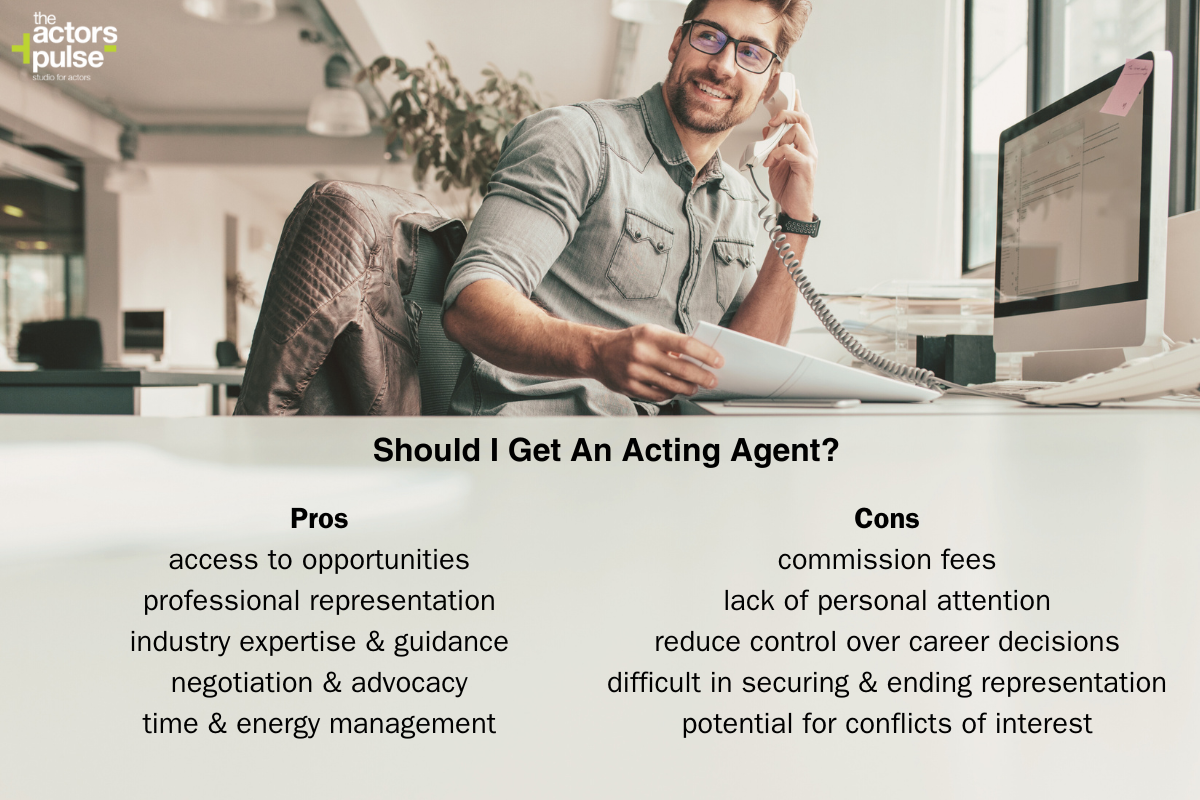The Pros and Cons of Having an Acting Agent
Contents
ToggleActing agents, can you succeed without one? What are their benefits and are there any pitfalls to signing with one?
While it’s true that most leading actors have agents, you’ll likely find that they all signed on with one at different times and experienced differences in career profession, both good and bad, as a result.
If you’re at the stage of your acting career where you’re beginning to consider an acting agent but still can’t decide if it’s the right move, you’re not alone.
Signing on with an agent is a big decision and one that requires careful thought. In this exploration, we delve into the pros and cons of having an acting agent so you can make the most informed choice for your career.
What Exactly Is An Acting Agent?
Acting agents represent an actor’s interests and serve as an intermediary between them and casting directors.
By leveraging their industry connections and expertise, they help to secure auditions, negotiate contracts, and propel their clients towards greater success.
Paid through a percentage of an actor’s fee, they are motivated to accelerate an actor’s career trajectory and advance their earnings for mutual benefit.
Pros of Having an Acting Agent
To begin, let’s take a look at all the positives that can come from having an acting agent.
1. Access to Opportunities
Acting agents possess valuable industry connections and insider knowledge, which can allow their clients access to a broader range of opportunities and more frequent auditions.
Through their network of contacts and relationships with casting directors, agents may also secure auditions for roles that might otherwise have been inaccessible.
Ultimately, they make you more visible within the industry which is essential to your continued success.
Stand Out.
Check our term dates, and enrol in classes today.
2. Professional Representation
An agent offers a level of professional representation that can significantly enhance an actor’s trajectory and prospects in the industry.
Handling the negotiating of contracts, navigating complex legal agreements and ensuring you are well paid, they protect your interests both now and into the future.
Additionally, they help legitimise your position as a bankable talent. While casting directors are not always swayed towards actors with representation, it does demonstrate an actor’s serious commitment.
3. Industry Expertise and Guidance
As acting agents possess a wealth of industry knowledge and experience, they are best placed to guide and mentor their clients.
From offering advice on audition techniques, formulating a career strategy, or keeping on top of industry trends, agents are an invaluable resource.
With their support, many actors find it easier to navigate the complexities of the entertainment business and can make well-informed, confident decisions regarding their careers.
4. Negotiation and Advocacy
It can be easy to be taken advantage of as a budding actor, without skilled representation you may find yourself underpaid, overworked and caught out by hidden fine print.
Perhaps one of their biggest pros, agents excel at negotiating contracts and securing favourable terms. Across industry standards and what constitutes a fair deal, an agent will fiercely advocate and negotiate to ensure your best interests are accounted for.
If fair compensation, safe working conditions, and opportunities for career advancement are important to you, an agent can help to guarantee these outcomes.
5. Time and Energy Management
If your star is on the rise and you find yourself overwhelmed by the demands of multiple auditions, callbacks, rehearsals and performances, an agent can help manage this.
Ensuring you are managing your time and energy well, an agent can come in particularly helpful if you are juggling multiple projects or pursuing opportunities in different markets.
By entrusting these logistical responsibilities to their agents, actors can more easily focus their time and energy on honing their craft and preparing for successful auditions.

Cons of Having an Acting Agent
As with most things, just as there are positives to having an agent as an actor, there can also be some downsides.
1. Commission Fees
The vast majority of acting agents are paid on a commission basis, earning a percentage of their client’s earnings from gigs and projects they have helped them to book.
While this fee structure can motivate an agent to work harder for their clients and means no upfront fees to pay, it does mean an actor must relinquish a portion of their income.
Typically this percentage is around 10% but may be higher depending on your agency agreement. If you are just starting out and every dollar counts, these fees can easily disrupt your financial stability.
This is largely why most actors do not take on an agent until they are established and earning a higher rate of remuneration.
2. Lack of Personal Attention
Agents will always be representing numerous clients simultaneously. Due to this, some actors may feel that at times they lack individual attention or support from their agents.
This can be especially true when an agency is representing higher-profile clients that are of a higher priority due to their notoriety and earning potential.
Just keep in mind that not all agents will have the same level of time or resources to devote to your career development, so choose wisely.
3. Reduced Control Over Career Decisions
While having an agent can advance your career opportunities, some actors find themselves feeling that they then also have limited control over career decisions.
From the types of roles pursued to the projects undertaken, actors often find themselves deferring to their agents’ judgement and expertise.
If potentially having to sacrifice your creative autonomy or take on roles that do not align with your professional goals doesn’t appeal, an agent may not be for you.
4. Difficulty in Securing & Ending Representation
Even if you decide the time is right to engage an agent, this process can be fraught with challenges.
If you are just starting out or lack industry connections, many agents may also decline to work with you. This can mean a lot of research and time spent seeking out the right agent and even then, you may find yourself repeating the process and moving agents multiple times throughout your career.
Once you’ve signed with an agency though, you may be contractually obliged to stay with them and do as requested, even if unhappy.
5. Potential for Conflicts of Interest
Some talent agents also represent casting directors, producers, or other industry professionals which can lead to a conflict of interest at times. This could see you passed over for roles in favour of someone else’s preferences or needs.
For this reason, transparency and open communication between an actor and their agent is essential and can help to facilitate a mutually beneficial and enjoyable professional relationship.
Invest In Yourself With The Actor’s Pulse
Ultimately, the decision to sign with an agent is a very personal one. If this is something you hope to one day pursue or have been declined due to lack of experience, continued education and practice are key.
At The Actors Pulse, we support our students to become accomplished actors through the ongoing development of their technique and skills.
As the Southern Hemisphere’s leading school for the Meisner technique, our alumni have a history of being well-received by agents and enjoy ongoing success here and overseas.
With a variety of classes available both part-time and full-time, we make it easier to pursue your acting dreams and become a sought-after agency talent.
To learn more or get started, contact The Actor’s Pulse today at 0414 475 515.

Billy Milionis is one of the few Australians to have ever studied under the legendary master teacher, the late Sanford Meisner. Billy has also studied story structure and scene analysis techniques with John Truby and later at UCLA. He has also spent several years doing improvisation in Hollywood with the L.A. Connection. In addition, he trained in the technique of Stella Adler, Practical Aesthetics and Lee Strasberg’s method.





